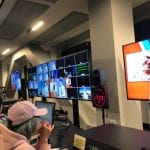Early Afternoon has been, to everyone’s credit, a great success. As we wrap up the semester, it’s important to reflect on the process, the successes, the limitations, the ‘could-be-better’s and of course the concept. ( is it a comedy news programme? )
Following up on my comments about week 11’s taping, I’m quite pleased to see that Anhar managed to channel her personality as well as exaggerate it for the weather segment. I think her delivery was amazing, and it did bring a sense of comedy to a segment that had heavy content. That blending of comedy through her performance as well as information being conveyed through the ‘weather’ news report is exactly the kind of merging of boundaries/binaries that comedy news is popular for. As discussed in week 1, that blending of binaries between information/entertainment, news/comedy is exactly what Early Afternoon was, in my opinion.
I’ve mentioned that Early Afternoon did not have the satirical element to it before, but I think I didn’t give everyone the credit that they/we deserve and found myself comparing a student driven production to a professional comedy news programme. To be fair, we did not have the multitude of experience to draw from like the professionals do, and I believe I was being too critical of our show for that. Comedy news is satire, and satire is public pedagogy ( Mclennan S 2011 ) Despite not having an audience present in either of our tapings I think it’s safe to say that yes, I did learn about politics and city council neglect and vaccinations and a good deal about the discourse in sports- all of which makes me critically analyse information related to those topics when it pops up on my newsfeed. Albeit more through the research, writing and creating process as compared to the 30 mins of condensed, taped information. Surely, I am considered a member of the public- so in that sense, yes, Early Afternoon did act as public pedagogy. Nobody realises the amount of research, of writing and re-writing that goes into the scripts. Being a producer, I was very involved in overseeing those processes and it truly makes me appreciate shows like The Daily Show and Last Week Tonight, even mainstream news shows ( as I’m sure their research processes are quite mirrored to ours ). It’s amazing how much information you take in just in the research process alone, nevermind the forming of a script.
I thoroughly enjoyed producing Early Afternoon with the class, however at times I felt it quite hard to communicate with everyone as it felt like we were split between first years and second years. I think if we had the chance to recreate the studio again, with the same people, I would work on my communication with everyone more. Ironically, one of the most interesting and fun times I’ve had with everyone was when we were filming the intro sequence outside of building 9. Here are some exclusive behind the scenes clips and pictures I’ve collected over the past 4 weeks.
-

-
Testing out equipment, week 9
-

-
Behind the scenes, week 11
I’ve worked on a live TV production and now a comedy news production and while Early Afternoon lacked the ‘chaotic calmness’ a live TV set would, it did have more information and depth packed into it. Being a producer on set proved to be more challenging than I had anticipated as there was a lot of micro-managing that had to be done but I thrive in a fast paced environment and I think despite feeling uncomfortable to have a chat with the first years, they listen to what I have to say and I listen to them too and we managed to pull it off!
As an overall, I was quite hesitant to take on The News Is A Joke as I felt it was almost a requirement to be funny all the time but alas my passion for TV production trumped my hesitation and I’m so glad it did. I never used to watch comedy news programmes and this was a huge step out of the comfort zone. My biggest takeaway from this studio is that I find myself having counterarguments and critically analysing mainstream news stories when I catch it on TV or on my newsfeed. I find myself going ‘ Is that really true or is this propaganda?’ most of the time. Initially, I felt like the biased perspective comedy news provided felt more like propaganda than the objective perspective that mainstream news offered. However, being exposed to all different types of comedy news shows and presenters ( Samantha B, John Oliver, Colbert, Stewart ) I now recognise that the exaggeration, the bias-ness is almost necessary (and possibly one of the most effective ways to put your point across ) We are quite possibly moving into a new era of technology, the baby boomers are retired and the millennials are taking over. We no longer want to be told this is what we should believe in, this is how you should react to the news. We want to form our own opinions of the news, we want transparency and real talk. Perhaps 10 years from now, mainstream news will become comedy news- it’s probably one of the only news programme types that people actually listen to anyway ( ie, the John Oliver effect ).
References:
McLennan S, 2011, America According to Colbert, Palgrave, Macmillan pg 71-95

